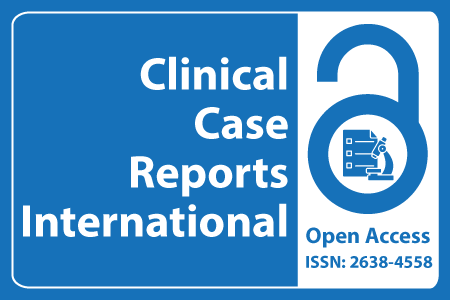
Journal Basic Info
- Impact Factor: 0.285**
- H-Index: 6
- ISSN: 2638-4558
- DOI: 10.25107/2638-4558
Major Scope
- Atherosclerosis
- Signs and Symptoms-Clinical Findings
- Pulmonary Medicine
- Breast Neoplasms
- Toxicology
- Mental Health
- Infectious Disease
- Physical Medicine & Rehabilitation
Abstract
Citation: Clin Case Rep Int. 2023;7(1):1472.DOI: 10.25107/2638-4558.1472
Syncope-Related Sinus Pause Secondary to the Use of Thalidomide in an Oncological Patient
Diniz RVZ, da Silva RA, de Morais AA and de Sousa JCV
Department of Clinical Medicine, University Hospital Onofre Lopes (HUOL/UFRN), Brazil
*Correspondance to: Rosiane Viana Zuza Diniz
PDF Full Text Case Report | Open Access
Abstract:
Introduction: Advances in oncological therapy have improved the survival rates of this population. The cardiovascular risk factors and cardiotoxicity control remains challenging, since drug interactions may result in significant clinical events.
Methods: This study describes a cardiotoxic event caused by syncope-related sinus pause, exacerbated or resulting from the use of thalidomide in a patient during multiple myeloma treatment.
Results/Discussion: A 63-year-old male submitted to VAD (vincristine, doxorubicin and dexamethasone) chemotherapy for multiple myeloma. After six months, the patient underwent a Bone Marrow Transplant (BMT), first with thalidomide, evolving with successive syncopal episodes (Stokes-Adams syndrome), one of which resulted in traumatic brain injury, with a fracture in the left temporoparietal region. A 24-h Holter showed 2 pause episodes of more than 2 sec, the longest being 18.5 sec, not associated with symptoms. It is known that patients submitted to chemotherapy are at risk of developing cardiotoxicity. Preventive measures should be part of clinical management, in order to prevent ventricular damage and the occurrence of other phenomena.
Conclusion: The use of thalidomide requires monitoring bradyarrhythmia’s and syncope. Medication with greater tolerability, such as lenalidomide, should be increasingly prescribed, thereby avoiding undesirable clinical situations that may directly affect patient morbidity and mortality.
Keywords:
#
Cite the Article:
Diniz RVZ, da Silva RA, de Morais AA, de Sousa JCV. Syncope-Related Sinus Pause Secondary to the Use of Thalidomide in an Oncological Patient. Clin Case Rep Int. 2023; 7: 1472..













